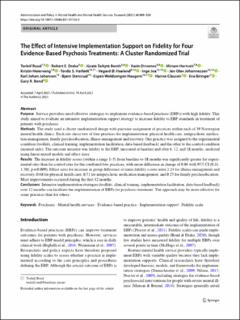| dc.contributor.author | Ruud, Torleif | |
| dc.contributor.author | Drake, Robert E. | |
| dc.contributor.author | Saltyte Benth, Jurate | |
| dc.contributor.author | Drivenes, Karin | |
| dc.contributor.author | Hartveit, Miriam | |
| dc.contributor.author | Heiervang, Kristin Sverdvik | |
| dc.contributor.author | Høifødt, Tordis Sørensen | |
| dc.contributor.author | Haaland, Vegard Øksendal | |
| dc.contributor.author | Joa, Inge | |
| dc.contributor.author | Johannessen, Jan Olav | |
| dc.contributor.author | Johansen, Karl Johan | |
| dc.contributor.author | Stensrud, Bjørn | |
| dc.contributor.author | Haugom, Espen Woldsengen | |
| dc.contributor.author | Clausen, Hanne Kristin | |
| dc.contributor.author | Biringer, Eva Aaker | |
| dc.contributor.author | Bond, Gary R. | |
| dc.date.accessioned | 2022-01-21T12:59:46Z | |
| dc.date.available | 2022-01-21T12:59:46Z | |
| dc.date.created | 2021-12-21T14:34:00Z | |
| dc.date.issued | 2021 | |
| dc.identifier.issn | 0894-587X | |
| dc.identifier.uri | https://hdl.handle.net/11250/2838726 | |
| dc.description.abstract | Purpose
Service providers need effective strategies to implement evidence-based practices (EBPs) with high fidelity. This study aimed to evaluate an intensive implementation support strategy to increase fidelity to EBP standards in treatment of patients with psychosis.
Methods
The study used a cluster randomized design with pairwise assignment of practices within each of 39 Norwegian mental health clinics. Each site chose two of four practices for implementation: physical health care, antipsychotic medication management, family psychoeducation, illness management and recovery. One practice was assigned to the experimental condition (toolkits, clinical training, implementation facilitation, data-based feedback) and the other to the control condition (manual only). The outcome measure was fidelity to the EBP, measured at baseline and after 6, 12, and 18 months, analyzed using linear mixed models and effect sizes.
Results
The increase in fidelity scores (within a range 1–5) from baseline to 18 months was significantly greater for experimental sites than for control sites for the combined four practices, with mean difference in change of 0.86 with 95% CI (0.21; 1.50), p = 0.009). Effect sizes for increase in group difference of mean fidelity scores were 2.24 for illness management and recovery, 0.68 for physical health care, 0.71 for antipsychotic medication management, and 0.27 for family psychoeducation. Most improvements occurred during the first 12 months.
Conclusions
Intensive implementation strategies (toolkits, clinical training, implementation facilitation, data-based feedback) over 12 months can facilitate the implementation of EBPs for psychosis treatment. The approach may be more effective for some practices than for others. | en_US |
| dc.language.iso | eng | en_US |
| dc.publisher | Springer | en_US |
| dc.rights | Navngivelse 4.0 Internasjonal | * |
| dc.rights.uri | http://creativecommons.org/licenses/by/4.0/deed.no | * |
| dc.title | The Effect of Intensive Implementation Support on Fidelity for Four Evidence‑Based Psychosis Treatments: A Cluster Randomized Trial | en_US |
| dc.type | Journal article | en_US |
| dc.type | Peer reviewed | en_US |
| dc.description.version | publishedVersion | en_US |
| dc.rights.holder | Copyright 2021 The Author(s) | en_US |
| cristin.ispublished | true | |
| cristin.fulltext | original | |
| cristin.qualitycode | 1 | |
| dc.identifier.doi | 10.1007/s10488-021-01136-4 | |
| dc.identifier.cristin | 1971103 | |
| dc.source.journal | Administration and Policy in Mental Health and Mental Health Services Research | en_US |
| dc.source.pagenumber | 909-920 | en_US |
| dc.relation.project | Helse Sør-Øst RHF: 2015106 | en_US |
| dc.identifier.citation | Administration and Policy in Mental Health and Mental Health Services Research. 2021, 48, 909-920. | en_US |
| dc.source.volume | 48 | en_US |

